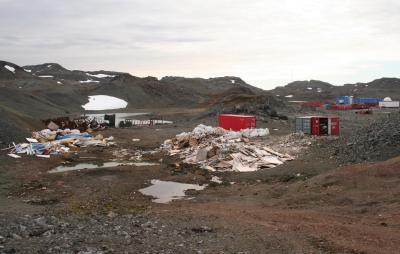When you think of the South Pole, you probably don't think of garbage.
Yet according to a report commissioned by the Federal Environment Agency (Umweltbundesamt) in Germany, the Antarctic is littered with leftovers from derelict experimental set-ups and field huts are slowly decomposing. Garbage containing dangerous chemicals, discarded oil cans and car batteries is lying in the open. Coastal waters and beaches are suffering oil-pollution as a result of poor handling of fuel at those science stations.
Yes, science is polluting. Even the sparse vegetation has been crushed by tire tracks and chains.
"We have a genuine waste problem in the Antarctic," says Dr. Hans-Ulrich Peter of the Friedrich Schiller University Jena.
A big concern is King George Island, about 120 kilometers off the Antarctic Continent. It is there, more precisely on the Fildes Peninsula, where the ecologist has been doing research on a regular basis since 1983 and meticulously documented the changes in the environment. "The Fildes Peninsula is one of the largest ice-free areas of the Antarctic with a relatively high degree of biodiversity," Peter says.
As a result the region has attracted a lot of scientific interest, along with the building of six permanently occupied stations including an aircraft runway concentrated in a relatively small area, which turned it into the logistic hub of the international Antarctic research – with all consequences of permanent human settlement.
In this context, natural life is equally threatened by the influence of human beings on the local environment of the south polar region. "Due to the extreme climatic conditions the sensitive vegetation only recovers very slowly," co-author Christina Braun, who has visited King George Island seven times for research purposes, says. "Vehicle tracks sometimes remain there for decades." But the vegetation is not only damaged by vehicles and building work. According to Braun the unique flora of the Antarctic is equally threatened by 'imported' plants. "Some years ago we found some non-native plants nearby the Russian research station Bellingshausen."
Insects and other animal and plant species inadvertently imported by participants of expedition present dangers for the ecosystem.
"If there isn't a profound change of direction, these negative environmental influences will be amplified in the next few years," Peter says.
In their report the German ecologists make specific suggestions for the management of this sensitive region: The crucial point is the designation of the Fildes Peninsula as an 'Antarctic Specially Managed Area' (ASMA). With this specific administrative instrument legally binding standards concerning the use of the region would be determined.
The proposed measure could reduce the conflicting interests between science, tourism and the protection of geological and historical sites as well as keeping its environment intact. A lack of consensus among the Antarctic Treaty states is an obstacle.

Antarctic waste reality: A Chinese refuse dump on Fildes Penninsula/King George Island in the 2008/09 season. Credit: Photo: Anja Nordt/FSU Jena




Comments